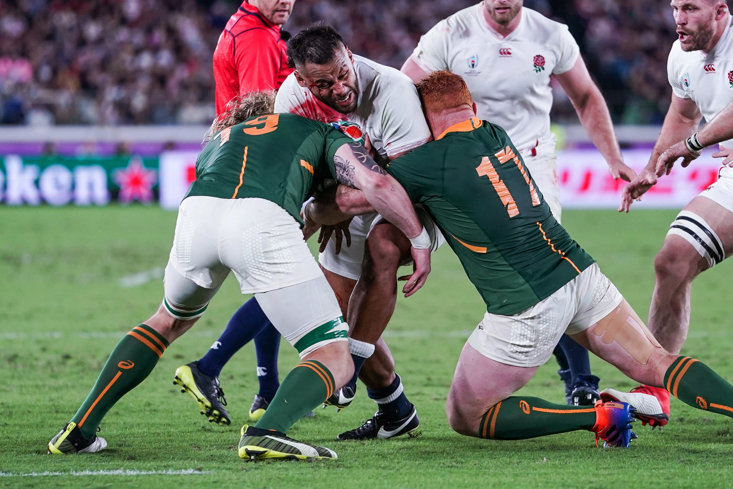Rugby’s new high-tackle rule saw a huge decrease in concussion incidents at last year’s World Cup, it has been revealed.
World Rugby announced that this winter’s tournament in Japan, which was the first tournament to feature the High Tackle Sanction Framework, saw a huge reduction in concussion injuries compared to the elite competition average of 2018, with an overall decrease of 28 per cent overall. As well, there was a huge 37 per cent decrease in tackle concussion incidents.
The move was made to reduce concussion in the sport by changing player behaviour from high-risk upright tackles, to lower-risk bent-at-the-waist challenges.
Referees helped, with a tough stance on tackles seeing yellow card sanctions go up by 74 per cent and a 138 per cent increase on red cards. World Rugby said the “tough deterrent was a direct contributing factor” in the improved numbers.
World Rugby chairman Bill Beaumont, who was captain of England and made 34 appearances between 1975 and 1982, said in a statement: "These hugely encouraging outcomes of this study endorse our unwavering evidence-based commitment to injury prevention, particularly our continued efforts to protect players from concussive events on the rugby field wherever possible.
"The significant reduction in concussion incidence provides compelling evidence of what can be achieved when competition owners, match officials, disciplinary officers, players and coaches fully buy into the High Tackle Sanction Framework. Failure to do so can have significant player welfare and performance consequences."

World Rugby Chief Medical Officer Dr Eanna Falvey added: “World Rugby’s role is to provide the best possible standard of care to our players, driven by an evidence-based approach.
“Rugby World Cup 2019 was the pinnacle of the men’s test game and a major platform to showcase best-practice in our sport. The medical standards implemented at the tournament achieved strong outcomes thanks to the buy-in from teams and medical staff.
“At Japan 2019, and all test matches since implementation in May 2019, we have been looking to protect players by changing culture and getting the tackler lower. These very positive outcomes suggest that teams embraced the challenge, resulting in a reduced injury risk, which is very encouraging.”
Overall, injuries dropped too in the international game. In 2015, there were 90 instances of players getting hurt per 1,000 hours at the World Cup, compared to 83 four years later.
The last tournament also provided the best injury statistics on record, with injury replacements per match down from 2.08 per match in 2015 to 1.13 in 2019.
An awareness programme also helped. While players adapted well to the new law, there was also a zero-tolerance approach on head contact. Combined with a framework supported by the most comprehensive player welfare standards programme ever operated at a rugby event, Rugby World Cup say it all contributed to the improved numbers.
With player welfare so important both during and after their careers, and the right measures being taken, such hugely positive numbers bode well for the future of rugby.